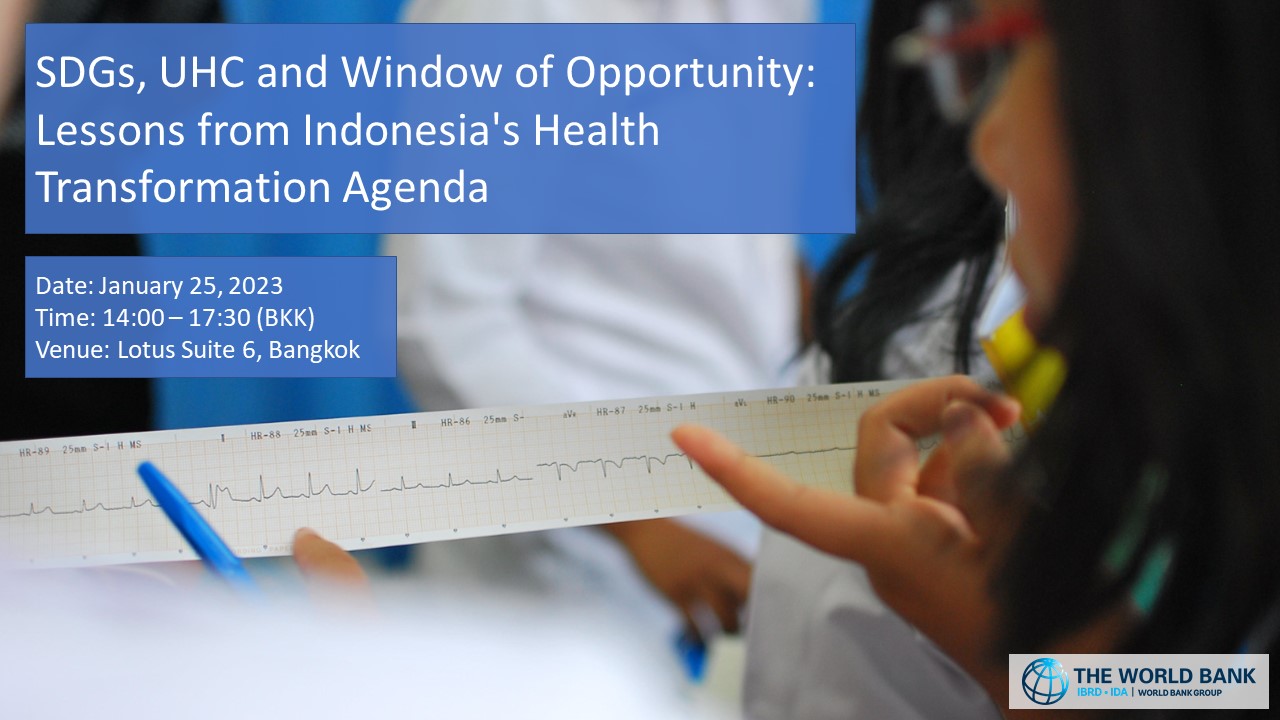Side Meetings
SMB308
SDGs, UHC and Window of Opportunity: Lessons from Indonesia's Health Transformation Agenda
25
Jan
- Somil Nagpal
- Zelalem Debebe
- Pandu Harimurti
- The World Bank

Spurred by an exceptional degree of commitment and drive from the highest levels of leadership, Indonesia is making significant advances towards achieving universal health coverage (UHC). In 2014, the Government of Indonesia (GOI) introduced a landmark national health insurance program, the Jaminan Kesehatan Nasional (JKN), which currently covers 87 percent of the population, and has dramatically increased financial protection from unexpected health expenditures, as well as improved coverage and utilization of essential health services. In order to sustain these achievements, accelerate progress and tackle numerous health system challenges that remain1, the GOI, based on a mandate from President, H.E. Joko Widodo, recently initiated a comprehensive transformation of its health care system, which addresses six key pillars – namely, (i) primary health care; (ii) secondary health care; (iii) health system resilience; (iv) health financing; (v) health talent; and (vi) health technology. The health system transformation initiative has the overarching aim of promoting a strong and healthy population and is embedded in ongoing initiatives and reforms to improve the quality and equity of healthcare services through accreditation efforts, the roll-out of clinical decision support tools for primary and secondary care providers, as well as innovations in health financing (e.g., performance based subnational fiscal transfers) and provider payment methods (e.g., performance based and risk-based capitation).
Such investments in UHC also help in the adaptation from the effects of anthropogenic climate change, as well as the country’s overall health security and pandemic preparedness and response capacity. The after-effects of the COVID-19 pandemic have also implicated a multi-pronged impact on countries' journey towards the SDG 3.8- the pursuit of universal health coverage. The example of Indonesia will help showcase how the country has continued on its SDG and UHC journey while responding effectively to the pandemic.
In light of the remarkable commitment of Indonesia’s (health sector) leadership towards its national health system transformation agenda, this proposed session invites senior policymakers from various agencies and ministries to reflect on this journey, as well as to ideate on what still awaits them in the future. Given the constrained timeframe, the discussions will in particular focus on the following two elements of the transformation agenda: (i) primary health care (PHC); and (ii) health financing. Within these two pillars, the session will focus on innovations to improve quality of care and service readiness (e.g., accreditation, clinical decision support tools, reorganization of service delivery, etc.) as well as innovations/reforms in performance-based sub-national fiscal transfers and provider payment methods. The policymakers will moreover be joined by country experts from other Asian countries, who will provide additional commentary and reflections from their own contexts and vantage points.

